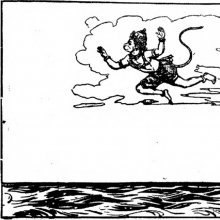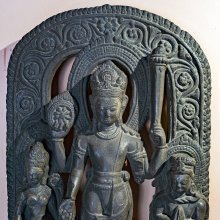Monarch: 1 definition
Introduction:
Monarch means something in Hinduism, Sanskrit. If you want to know the exact meaning, history, etymology or English translation of this term then check out the descriptions on this page. Add your comment or reference to a book if you want to contribute to this summary article.
Images (photo gallery)
In Hinduism
Shaivism (Shaiva philosophy)
Source: SOAS University of London: Protective Rites in the Netra TantraMonarchs and Mantrins approach rites to conquer death in very different ways. For a Monarch, these rites should allow him to continue to rule through the prolongation of life, attainment of wealth, and a prosperous family. To achieve these aims, the king employs a Mantrin to perform complex rituals. When the Mantrin seeks to conquer death for himself, he turns to contemplative practice.

Shaiva (शैव, śaiva) or Shaivism (śaivism) represents a tradition of Hinduism worshiping Shiva as the supreme being. Closely related to Shaktism, Shaiva literature includes a range of scriptures, including Tantras, while the root of this tradition may be traced back to the ancient Vedas.
See also (Relevant definitions)
Starts with: Monarch prairie grass, Monarch redstem, Monarchy.
Full-text (+230): Rajasuya, Paramaraja, Sarveshvara, Ekadhipati, Nripa, Ekaraja, Nagarjuna, Rajavat, Daushmanti, Sarvasvamin, Mahacakravartin, Rajanvat, Jagadekanatha, Sarvesha, Yayati, Kraturaja, Cakkavatti, Ekaparthiva, Monarch redstem, Sarvabhauma.
Relevant text
Search found 175 books and stories containing Monarch; (plurals include: Monarches). You can also click to the full overview containing English textual excerpts. Below are direct links for the most relevant articles:
Chapter 3 - Bhishma Abducts Three Princesses < [Adi Parva]
Chapter 5 - Lord Krishna Benedicts the Imprisoned Kings < [Sabha Parva]
Chapter 1 - Maharaja Shantanu Marries the Celestial Ganga < [Adi Parva]
Shishupala-vadha (Study) (by Shila Chakraborty)
Dvādaśarāja-maṇḍala (The twelve kings) < [Chapter 3 - Six fold policies of a king (Ṣāḍguṇya)]
Tax in the Śiśupālavadha < [Chapter 5 - Policies of taxation]
Spies in ancient Indian kingdoms (Introduction) < [Chapter 4 - Activities of spy]
The Great Chronicle of Buddhas (by Ven. Mingun Sayadaw)
Part 43 - Four Marvellous Qualities of a Universal Monarch < [Chapter 40 - The Buddha Declared the Seven Factors of Non-Decline for Rulers]
Part 41 - Stupa in Honour of the Buddha < [Chapter 40 - The Buddha Declared the Seven Factors of Non-Decline for Rulers]
The Gilānadassana Sutta < [Chapter 45a - The Life Stories of Male Lay Disciples]
Mahabharata (English) (by Kisari Mohan Ganguli)
Section XCVIII < [Tirtha-yatra Parva]
Section CLXXXIV < [Caitraratha Parva]
Section 1 < [Shalya Parva]
Bhagavati-sutra (Viyaha-pannatti) (by K. C. Lalwani)
Chapter 9: Rājarṣi Śiva < [Book 11]
Part 2 - Introduction to book 1 < [Chapter 1]
Part 2 - Jamāli the rebel < [Chapter 33]
Ramayana (by Manmatha Nath Dutt)
Chapter VIII < [Book 1 - Bāla-kāṇḍa]
Chapter IX < [Book 1 - Bāla-kāṇḍa]
Chapter XLII < [Book 1 - Bāla-kāṇḍa]

